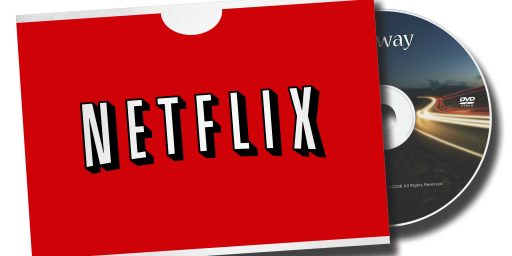Internet Distribution of Movies
Mark Tapscott notes that, despite incredible publicity and critical acclaim, neither gay cowboy movie “Brokeback Mountain” nor George Clooney’s “”Blood for Oil” did well at the box office. Indeed, the lousy remake of the lousy 1970s flick “Fun with Dick and Jane” swamped them both.
He then asks an interesting question:
And how long before we see genuinely independent film makers who are much more in tune with the general public’s tastes going around the existing distribution system by showing their products only on pay-per-view Internet sites?
Just think how much cheaper tickets would be and how much more convenient “going to the movies” would become with Internet-only distribution. And most important, can you imagine how much artistic creativity would be unleashed among movie makers by their being freed of Hollywood’s conventions?
Let us, for the sake of argument, fiat away concerns about piracy and any technical issues. Would this be a good idea?
It would, certainly, challenge Netflix and other movie rental outlets as well as the pay-per-view options offered by cable and satellite providers. For those who simply want to watch movies qua movies, this might be quite attactive. There is, however, another aspect to movie-going: Getting out of the house.
Mark Cuban, who in addition to having founded Broadcast.com and owning the NBA’s Dallas Mavericks owns Landmark Theaters, HDNet Films, and a movie production and distribution company. Responding to remarks by John Fithian, the head of the National Association of Theatre Owners, about the threat of changing distribution mechanisms to his industry, Cuban scoffs,
Guess what John, I can whip up a mean steak, but I still like to go to restaurants. Because I enjoy it. I enjoy getting out of the house with family, friends, who ever.
Every single Mavs game is on TV. It wasnt that long ago that some people in the sports business thought that having games on TV would reduce attendance. After all, why go to the game when you can watch it for free on TV ? Then someone decided to do some research and as it turns out, the more games you broadcast on TV, the more people who go to your games. At the NBA, when we do our analysis to determine the revenue opportunity in any given market, the number of games broadcast is one of the criteria analyzed.
Hey John, you can get just about anything you want online….. but people still go shopping.
Going to a restaurant. Going to a sporting event. Going shopping. Cabin Fever is alive and well. Wanting to get away from your parents, your kids, your job, your apartment, your house, your problems will never, ever go out of style. For the next thousand years the question will be asked…
What do you want to do tonight ? For the next thousand years, people will want to get the heck out of the house. The question is where to and why.
Quite right. As Cuban has demonstrated over and over, creative businessmen will figure out how to get people to choose their venues when answering the “where to and why” questions.
Satellite radio and mp3 players haven’t killed the music industry, especially live concerts, and Netflix hasn’t killed the theater business. It’s highly unlikely that anything coming down the pike will do that.
I agree with Tapscott that finding ways around the Hollywood Establishment will likely be a good thing for many filmmakers. Ironically, though, it will almost surely result in a lot more films like “Brokeback Mountain,” since the main obstacle to putting out films with niche appeal is the costs of marketing and distributing them.
Update: Glenn Reynolds has some related thoughts on whether podcasting will kill talk radio…or blogging over at TCS.






Mark Tapscott notes that, despite incredible publicity and critical acclaim, neither gay cowboy movie “Brokeback Mountain” nor George Clooney’s “”Blood for Oil” did well at the box office. Indeed, the lousy remake of the lousy 1970s flick “Fun with Dick and Jane” swamped them both.
Sorry James, but Tapscott’s statement is a bit too simplistic, especially at this stage of the game for a drama such as “Brokeback”.
Generally, dramas don’t “break big” in their initial release. They ponder along for six months. A hit such as “Brokeback” will eventually match the numbers of a “Fun with Dick and Jane”.
Case in point: “Brokeback” has been in release for 45 weeks. It has generated 42 million in box office returns. “Fun with Dick and Jane” has been in release for 33 weeks and has generated 101.7 million in bo revenue. But, that is not the entire story.
“Dick and Jane” has seen a 30% drop in bo in the past week, a trend which is expected to continue. It will not be in theaters by the end of the month, more or less. Further, it was in 2800 theaters and averaged only $2156 per screen. The returns for this movie were mostly based upon “early bounce”. But, it has no “legs”. It will continue its slow slide and disappear onto the shelves at Blockbuster where it will undoubtedly make more money.
Compare that to “Brokeback Mountain”, (Which I have not seen yet.) which has a 35% INCREASE in bo the past week, is being viewed in less than half of the screens of “Dick and Jane”, 1196, for an average of $6,548 per screen.
“Brokeback” has legs, it’s audience is increasing, and at this rate, will likely double or triple its box office returns within the next six months or so.
Once the Oscar nominations come out, if it gets noms, which is most likely, it will then become a long term success, rather than a short term one such as “Dick and Jane”.
Futher, “Brokeback” cost $14 million to produce, add another $5 to 10 in advertising costs, and it is still considered a profitable film, already doubling the invesetment with $42 million in box office.
http://www.boxofficemojo.com/movies/?id=brokebackmountain.htm
Compare that to “Fun with Dick and Jane”, which cost $100 million to produce, (not including ads) and as noted above, has made around $101 million so far in box office returns, which is around $1 million in profit, but assuming P and A expenses, “Dick and Jaen” is still likely operating at a loss.
http://www.boxofficemojo.com/movies/?id=funwithdickandjane.htm
So, which is the more profitible film: “Brokeback Mountain or “Fun with Dick and Jane”?
Clearly “Brokeback”. You can not simply look at overall returns as Tapscott has done.
Regarding “Syriana”, with a production budget of 50,000,000, it has made $45 million in box office, and is expected to make the same amount when it is relaesed overseas.
Correction/Addendum:
Fun with Dick and Jane has made
Domestic: $101,713,243 77.9%
+ Overseas: $28,778,724 22.1%
= Worldwide: $130,491,967
with an estimated $15 million spent on marketing worldwide, for ballpark of $15 to 20 million in profit on an estimated $115 million investment.
I would think Tivo might have the beginnings of an infrastructure to deliver at least television content over the web if it chose to break loose of the restrictions of what’s available to the user locally.
Obviously that would be more of a legal challenge than a technological one, but there have been times I’ve wished I could tune in on a channel in another city, or just one that’s not on my cable system. For one thing, there are two PBS affiliates serving Atlanta, but only one on this cable system — and it’s not the one that had “The Red Green Show.”
And how long before we see genuinely independent film makers who are much more in tune with the general public’s tastes going around the existing distribution system by showing their products only on pay-per-view Internet sites?
Who says “genuinely independent film makers” are “much more in tune with the general public’s tastes”? It would seem that such film makers are more in tuned with the tastes of narrow demographic strata, not the general public.